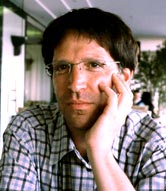Paul Mitchell, the Emmy Award-winning director of GREETINGS FROM GROZNY, discusses his impressions of the situation in Chechnya.
WIDE ANGLE: What makes you want to cover Chechnya?
PAUL MITCHELL: Perhaps viewers will find the segment with the Russian soldiers the most compelling or the most exciting, but I think that we actually make these films because it gives people like the students at Grozny University or in the refugee camps a chance to have a voice. They were all willing to take a certain amount of risk to be in the film. It’s our job to give them the vehicle to tell their story. And luckily PBS and WNET have been willing to put this series together so viewers can hear from them, too.
WIDE ANGLE: In your film, you featured many Russian soldiers who wanted to return home. What did they think the chances were for their every going home? How do they keep on going in Chechnya?
PAUL MITCHELL: The Russian army is much like other armies. The soldiers in Chechnya do a two year tour of duty after which they will be rotated home. Many of the soldiers in the film are members of elite Special Forces units, who serve more tours in Chechnya because they are more useful. Others soldiers are what the Russians call kontraktniki, that is, veterans who have re-enlisted with the express purpose of being sent on combat duty. They do it because, by Russian standards, it pays well.
What we could see from the main army base in Grozny, in a settlement called Khankala, is that the Russian army is digging in for a long stay. They are putting up permanent dwellings, housing for officers and have brought in a massive amount of hardware. There is no hint at all that they are planning to leave any time soon.
WIDE ANGLE: In April 2002, the UN Human Rights Commission in Geneva voted down a resolution for an investigation of Chechnya. Why do you think that the international community has not reacted more harshly to the events in Chechnya?
PAUL MITCHELL: I can’t answer that question – you would have to ask the delegations in Geneva and the various state departments and foreign ministries around the world. One might speculate that there is an understood quid pro quo for Russia’s support for the U.S. war on terror, but that’s only speculation.
WIDE ANGLE: What are the living conditions like for the 150,000 Chechen refugees in Ingushetia?
PAUL MITCHELL: In the tent cities, the living conditions are dreadful. The tent cities are cold and dangerous in winter. The tents are heated by open gas burners and it’s not uncommon for them to go up in flames. There are only outhouses for toilets. Many other refugees who have been put up by families are living somewhat better. But it is obvious that the fear of life under Russian occupation keeps the refugees in the camps.
WIDE ANGLE: Russian President Vladimir Putin has portrayed the Chechen separatists as terrorists. Do you think they are terrorists?
PAUL MITCHELL: I think this is a political rather than a factual question. Certainly those who plant mines in civilian markets in the border areas outside Chechnya are terrorists. But what, then, is a Russian pilot who bombs house after house in a village? When masked soldiers arrive unannounced in a village and arrest dozens of men simply because they are of fighting age, hold them without charge, deny them access to legal aid, torture and beat them, is that a security operation or terror? If you are a Russian soldier travelling in an APC, wondering if you might be blown up at any moment by radio-controlled mine, I expect it’s very terrifying.
WIDE ANGLE: After the first war, there was a rise in Islamic fundamentalists in Chechnya. How much do you think this has contributed to the current conflict?
PAUL MITCHELL: It’s difficult to say. The Chechen government in the inter-war period 1996-1999 wasn’t able to keep a lid on radical Islamic groups or the powerful criminal gangs who preyed on Chechens, Russians and foreigners. They caused a lot of misery, but we don’t know whether and to what degree Moscow helped these groups, with the aim of destabilizing independent Chechnya. It’s a murky story which conspiracy theorists have had a field day with.

